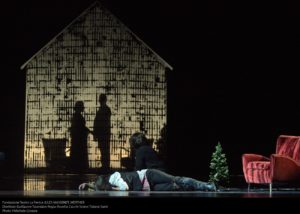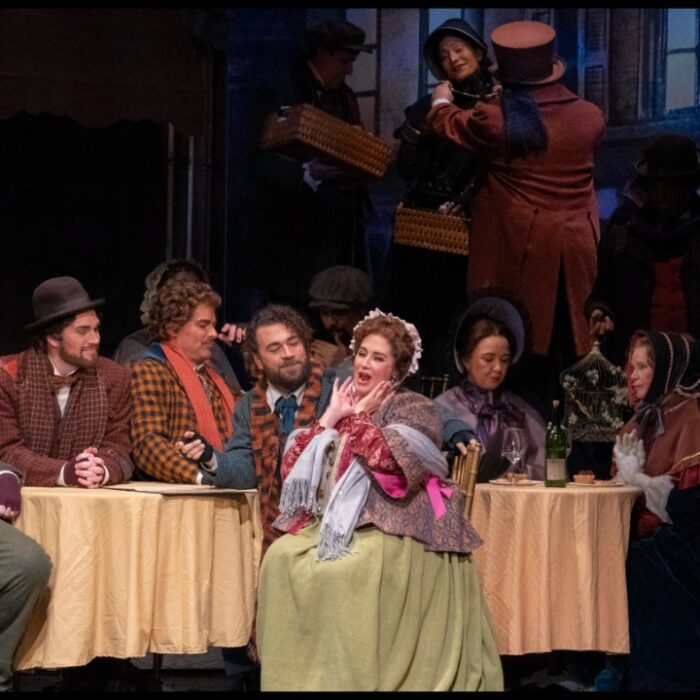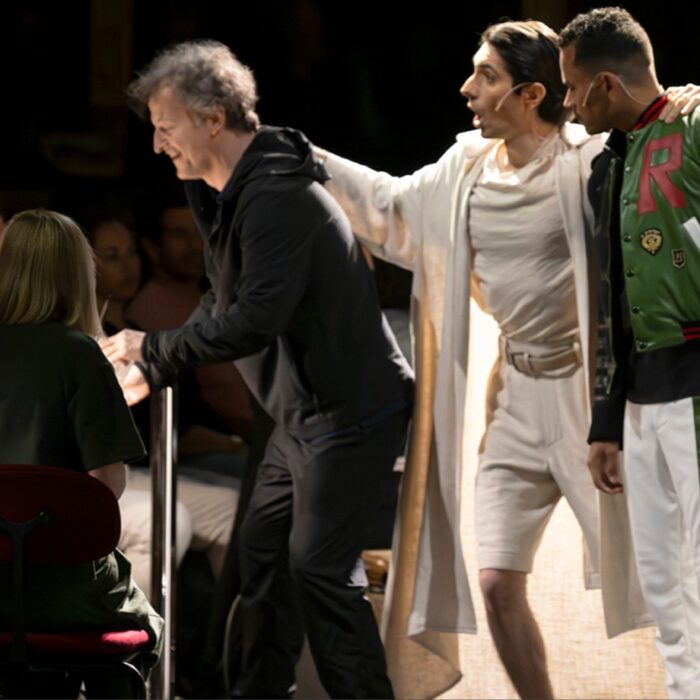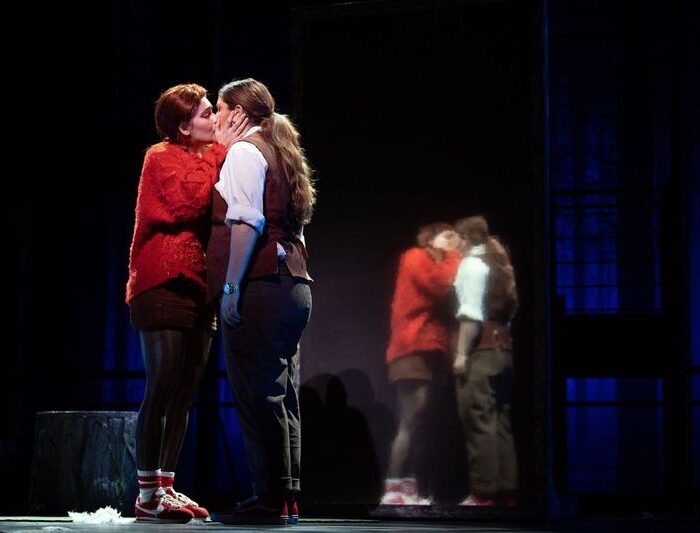
Teatro La Fenice 2018-19 Review: Werther
By Alan NeilsonSentimentality is possibly one of the most dishonest emotions we, as human beings, experience. It is also a destructive force in that it inserts a filter between reality and our perceptions, we cease to see the world as it is, but rather allow ourselves to construct a self-indulgent version, in which our feelings are deliberately accentuated or even completely manufactured, and in which our reactions to events become dishonest, although not always with negative consequences. It is essentially a manifestation of our own selfishness, a fundamentally egocentric emotion.
Genuine emotional responses are, by contrast, direct, unfiltered and honest. Yet human beings are prone to bouts of sentimentality, as are of course the creative arts, including opera. This may be in the form of a manipulative attempt by the composer and librettist to exploit the audience’s sentimental outlook, as is the case in the operas of Puccini, or through the creation of characters who are themselves victims of their own sentimental natures. Certainly, such characters are not always easy to identify nor necessarily fixed, given that they are open to interpretation by directors and singers. And it was such considerations which were at the core of Rosetta Cucchi’s production of Massenet’s “Werther,” currently being staged at Venice’s La Fenice.
How Fantasy Creates Loss
In the final act Werther eventually succumbs to the bullet with which he shot himself; his suicide, a direct result of his unrequited love for Charlotte. Whether, of course, this is because he allows his emotions a free reign, or it is a consequences of his own sentimentality which has exacerbated his emotional state is a matter of conjecture, with both interpretations being possible.
Cucchi, however, took a clear stance on this, interpreting Werther’s behavior as unambiguously sentimental, and in order to reinforce this view introduces another layer to the drama: from the overture until the very end Werther is seen reflecting on his life as it might have been with Charlotte; he is fantasizing, about a possible life which might have been. His emotions are, therefore, related to more than just his love for Charlotte. Yet, none of this is real; it is a sentimental vision of the future, and an idealization of his love, so that when he is rejected, the effect is magnified to the point that his life loses its meaning and suicide becomes his way out. It was a strong reading of the work which also used the sentimentality embedded within the work to explore the effects of sentimentality, rather than making the production a sentimental reading in itself.
Cucchi described the production as an abstract presentation, in which time and place were not of particular consequence, but that does not really describe the staging. The sets designed by Tiziano Santi, were clearly focused on a bourgeois household in a 20th century setting, and which were easily recognizable as such; even Werther’s fantasies were set in a normal house, although as the opera progressed it tended to disappear into the shadows.
The costumes, also taken from the 20th century, were designed by Claudia Pernigotti, which were generally used to reflect the character: Sophie as an adolescent; Albert straight-laced and conventional, while Werther’s attire was suggestive of a bohemian, and so on. All were pleasing on the eye, apart that is from Charlotte, whose dresses were miserably drab, and diminished her visual impact.
Dramatically, the production combined well with Cucchi’s underlying conception of the work. It contained an engaging dynamic, the characters were clearly defined, their interactions convincingly constructed and the inner tensions of the narrative perfectly captured, in what was a well-balanced, pleasing presentation.
Stepping In & Dominating
The internationally acclaimed French tenor, Jean-Francois Borras, was a replacement for the advertised Piero Pretti, and produced a compelling performance in the title role.
He possesses a notable stage presence, and used it effectively to define his character as a passionate romantic, who spends much of his time contemplating his own dreams. His Act one aria and pantheistic ode, “O nature, pleine de grace,” not only allowed him to show off the well-rounded sound and lyrical beauty of his voice, but also captured Werther’s dreamy nature, a characteristic which Borras was able to maintain throughout the performance.
His voice is strong, with an attractive timbre, which maintains its quality over the range. In Act three, he sings the famous aria, “Pourquoi me reveiller.” Each line was intelligently crafted and inflected with passionate intensity. The voice soared upwards without any sign of it being forced, long lines were sustained with apparent ease, and the underlying beauty of the voice rarely wavered.
However, Borras was able to do more than simply churn out beautiful sounding arias. He also imbued his singing with dramatic depth in wonderfully expressive and emotionally charged scenes. The exchanges with Charlotte were high octane affairs in which both singers fully committed themselves, with great dramatic effect. It was a passionate, dramatically convincing and musically pleasing portrayal of the Romantic hero.
Intense Counterpoint
Sonia Ganassi played the role of Charlotte. Having seen Ganassi in a number of semi-comedic roles, including Pamela in Auber’s “Fra Diavolo” and Elisa in Donizetti’s “Enrico Borgogna (both of which she dispatched in fine style),” it was interesting to see her in a very different role, one requiring dramatic intensity and expressive depth.
It was a testament to her skills, not just as a singer but also as an actress, that she essayed the part with such conviction, depth and ability, and made it difficult to connect her to the earlier roles. If her performance in Acts one and two were slightly lukewarm, Acts three and four were powerfully and expressively delivered.
Her opening to Act three, including the “Air des lettres” in which she sings of her remorse of having persuared Werther to leave, was convincingly heartfelt, her voice heavy with regret. Here, she used her colorful palette and well-placed accents to highlight her inner sadness. In the final act, the intensity of her singing captured Charlotte’s utter devastation as she confronts the dying Werther, in what was a gripping performance.
Perhaps it would have been interesting to also see Ganassi was bring more adolescent tone and charm to the role; Charlotte is, after all, a young woman. It didn’t help that the lifeless costumes did little to add to her character.
Up and Down
Pauline Rouillard playing Charlotte’s sister, Sophie, made an excellent impression. Her acting was lively and nuanced, and she managed to bring sufficient development to her character, who over the course of the year, notably matured. Her singing was clear and fresh; her aria, “Ah! le rire est béni,” was delightfully presented, the short coloraturas bright and vibrant. Her voice also made for a pleasing contrast with and complement to Ganassi’s heavier and darker voice.
Simon Schnorr failed to take full advantage of the opportunities presented by the character of Charlotte’s husband, Albert. Although he managed to generate the necessary emotion and conviction, especially in his confrontation with Charlotte at the end of Act three, his singing, and in particular his phrasing was inconsistent.
Armando Gabba gave a solid performance in the role of Charlotte’s father, looking every bit the typical bourgeois family man. His two drinking friends, Schmidt and Johann, were played by the tenor, Christian Collia, and the bass, William Corrò, respectively. Both regularly play smaller roles at La Fenice, and produce singing and acting of quality, which they also delivered on this occasion.
Both the Coro del Teatro La Fenice under the direction of Claudio Marino Moretti, and the children’s choir under the direction of Alessandro Toffolo put in good performances
Guillaume Tourniaire, conducting the Orchestra del Teatro La Fenice, produced an energetic, well-paced reading in which he accentuated the dynamic contrasts, with the timpani and brass being allowed to forcefully announce themselves , the fortissimo sound of the whole orchestra often rising with an almost deafening intensity, which although successfully highlighting the musico-dramatic nature of the score, was perhaps a little loud on occasions. Tourniaire, however, never allowed it to compromise the balance between the orchestra and the stage, nor did he allow it to detract from the textural qualities of the score which he skillfully elicited from their playing.
This was a cleverly thought-through presentation of Massenet’s masterpiece, in which Cucchi used the work’s potential for sentimentality to explore this very emotional idea and its possible tragic consequences. Moreover, it was underpinned by some fine musical performances, most notably from Borras, who made a strong impression in the title role.


